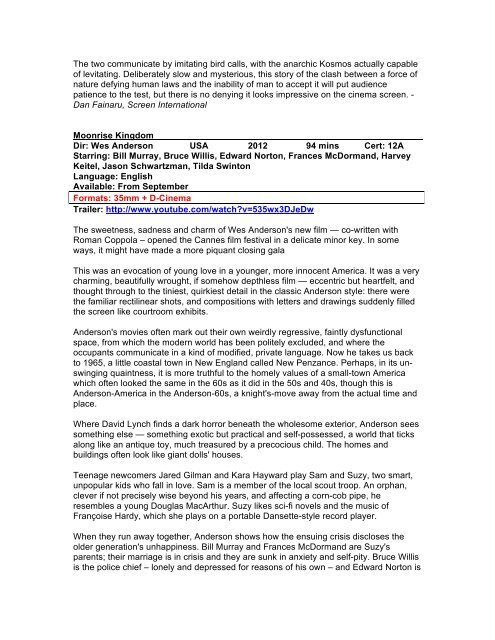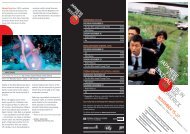35mm and DCP List Autumn 2012 - Access Cinema
35mm and DCP List Autumn 2012 - Access Cinema
35mm and DCP List Autumn 2012 - Access Cinema
Create successful ePaper yourself
Turn your PDF publications into a flip-book with our unique Google optimized e-Paper software.
The two communicate by imitating bird calls, with the anarchic Kosmos actually capable<br />
of levitating. Deliberately slow <strong>and</strong> mysterious, this story of the clash between a force of<br />
nature defying human laws <strong>and</strong> the inability of man to accept it will put audience<br />
patience to the test, but there is no denying it looks impressive on the cinema screen. -<br />
Dan Fainaru, Screen International<br />
Moonrise Kingdom<br />
Dir: Wes Anderson USA <strong>2012</strong> 94 mins Cert: 12A<br />
Starring: Bill Murray, Bruce Willis, Edward Norton, Frances McDorm<strong>and</strong>, Harvey<br />
Keitel, Jason Schwartzman, Tilda Swinton<br />
Language: English<br />
Available: From September<br />
Formats: <strong>35mm</strong> + D-<strong>Cinema</strong><br />
Trailer: http://www.youtube.com/watch?v=535wx3DJeDw<br />
The sweetness, sadness <strong>and</strong> charm of Wes Anderson's new film — co-written with<br />
Roman Coppola – opened the Cannes film festival in a delicate minor key. In some<br />
ways, it might have made a more piquant closing gala<br />
This was an evocation of young love in a younger, more innocent America. It was a very<br />
charming, beautifully wrought, if somehow depthless film — eccentric but heartfelt, <strong>and</strong><br />
thought through to the tiniest, quirkiest detail in the classic Anderson style: there were<br />
the familiar rectilinear shots, <strong>and</strong> compositions with letters <strong>and</strong> drawings suddenly filled<br />
the screen like courtroom exhibits.<br />
Anderson's movies often mark out their own weirdly regressive, faintly dysfunctional<br />
space, from which the modern world has been politely excluded, <strong>and</strong> where the<br />
occupants communicate in a kind of modified, private language. Now he takes us back<br />
to 1965, a little coastal town in New Engl<strong>and</strong> called New Penzance. Perhaps, in its unswinging<br />
quaintness, it is more truthful to the homely values of a small-town America<br />
which often looked the same in the 60s as it did in the 50s <strong>and</strong> 40s, though this is<br />
Anderson-America in the Anderson-60s, a knight's-move away from the actual time <strong>and</strong><br />
place.<br />
Where David Lynch finds a dark horror beneath the wholesome exterior, Anderson sees<br />
something else — something exotic but practical <strong>and</strong> self-possessed, a world that ticks<br />
along like an antique toy, much treasured by a precocious child. The homes <strong>and</strong><br />
buildings often look like giant dolls' houses.<br />
Teenage newcomers Jared Gilman <strong>and</strong> Kara Hayward play Sam <strong>and</strong> Suzy, two smart,<br />
unpopular kids who fall in love. Sam is a member of the local scout troop. An orphan,<br />
clever if not precisely wise beyond his years, <strong>and</strong> affecting a corn-cob pipe, he<br />
resembles a young Douglas MacArthur. Suzy likes sci-fi novels <strong>and</strong> the music of<br />
Françoise Hardy, which she plays on a portable Dansette-style record player.<br />
When they run away together, Anderson shows how the ensuing crisis discloses the<br />
older generation's unhappiness. Bill Murray <strong>and</strong> Frances McDorm<strong>and</strong> are Suzy's<br />
parents; their marriage is in crisis <strong>and</strong> they are sunk in anxiety <strong>and</strong> self-pity. Bruce Willis<br />
is the police chief – lonely <strong>and</strong> depressed for reasons of his own – <strong>and</strong> Edward Norton is




